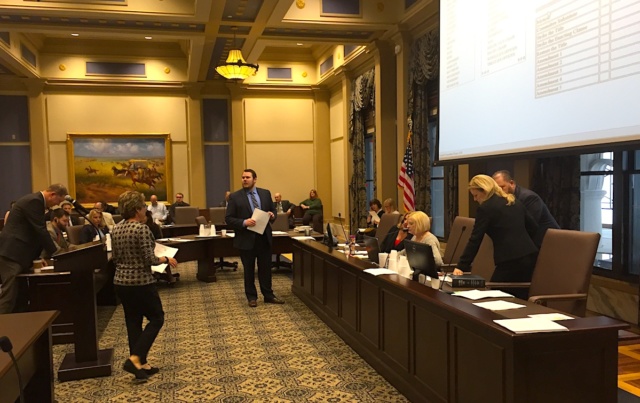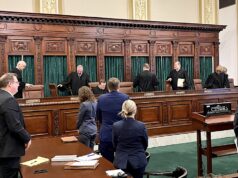

(Update: This story was updated at 1:27 p.m. Friday, May 12, to include quotes from senators who voted on the measure and list which members voted yes and no.)
A bill to loosen gaming regulations and change the state’s compact negotiation process with tribes failed in the Senate Joint Committee on Appropriations and Budget today shortly after noon.
The proposal was supposedly a key component of a bi-partisan budget deal floated by House Republicans and House Democrats, and its failure during an unusual Friday legislative meeting signals yet another hiccup as lawmakers head into the final week to pass measures raising new revenue.
SB 857 (embedded below) would have allowed the governor of Oklahoma to offer supplemental latitude on table games and sports betting to existing gaming compacts with tribes. Functionally, lawmakers were told that roulette and craps could have been played with “balls and dice” instead of their current limitation to card-based versions of the games.
“Dice and marbles. Why have they been excluded in the past?” Sen. Ervin Yen (R-OKC) asked during the meeting. “Are they the heroin of gambling? I really don’t know anything about gambling.”
Sen. Eddie Fields (R-Wynona) did not directly answer the question, simply saying that previously the games had been played with cards under Oklahoma compact rules.
Fields was also asked what the fiscal impact of the bill would be on the state’s $878 million budget shortfall. Fields said the Senate had not received an official fiscal impact from staff yet.
“No, we don’t have any fiscal impact,” Fields said. “I know in the House version there was a number of $20 million floated out there.”
The vote failed 16-22 with Republicans and Democrats both voting no. A similar bill passed the House Joint Committee on Appropriations and Budget on Thursday, but Friday’s defeat of the Senate version — which did not change the renegotiation date of the state gaming compact like the House version did — leaves substantial questions about where lawmakers will go from here come Monday.
‘I don’t know if it did good or harm’
Sen. Bryce Marlatt (R-Woodward) was one of multiple senators who said the complicated issue arose so quickly that he did not feel comfortable voting yes Friday.
“I didn’t have time to really get a grasp of what all was going on, and at the end I tried to talk to parties on all sides and evaluate what the bill actually did. I wasn’t comfortable that I was getting different information,” Marlatt said. “If we can get some clarification and the Pro Temp brings it back up, I’d be glad to re-evaluate the whole thing.”
Sen. Greg McCortney (R-Ada) also felt he was not given enough time to review the proposal.
“My biggest thing on the gambling bill is it came so fast. Compacts are incredibly complex,” McCortney said. “I don’t know if it did good or harm, and I didn’t have time to find the right answers.”
Sen. A.J. Griffin (R-Guthrie) voted in favor of the gaming bill.
“We’re trying to get a deal done. We’re at a point when we have to use every tool available,” Griffin said. “When it comes to gaming, we have gaming in the state. The type of game that’s played at the table is, quite frankly to me, fairly irrelevant. The genie is out of the bottle on that one. If we’re going to have it as entertainment in the state, we might as well have high-quality entertainment. To me it was kind of a no-brainer.”
Griffin said the House bill’s modification of the compact renegotiation date made it dead on arrival in the Senate, but she said trying to leverage tribal involvement in the budget negotiation process could have been helpful in striking the grand deal lawmakers seek.
“At this point, to get the House to move on anything it was key,” she said.
Sen. Nathan Dahm (R-Broken Arrow) voted no for a slightly different reason.
“I think that the Legislature should be more involved in the compacting process,” Dahm said. “The U.S. Constitution has the U.S. Senate that ratifies all treaties, and I thought we should do the same thing here. The State Senate should ratify our compacts, or the entire Legislature should be [involved] instead of having just the governor do that.”
Multiple other senators who voted said they did not want to comment.
Who voted how
Senators who voted yes included:
Michael Bergstrom (R-Adair)
Stephanie Bice (R-Yukon)
Larry Boggs (R-Wilburton)
Tom Dugger (R-Stillwater)
A.J. Griffin (R-Guthrie)
David Holt (R-OKC)
Chris Kidd (R-Addington)
Lonnie Paxton (R-Tuttle)
Dewayne Pemberton (R-Muskogee)
Adam Pugh (R-Edmond)
Dave Rader (R-Tulsa)
Sharp (R-Shawnee)
Roger Thompson (R-Okmulgee)
Ervin Yen (R-OKC)
Vice Chairman Eddie Fields (R-Wynona)
Chairwoman Kim David (R-Wagoner)
Senators who voted no were:
Mark Allen (R-Spiro)
Josh Brecheen (R-Coalgate)
Nathan Dahm (R-Broken Arrow)
Julie Daniels (R-Bartlesville)
J.J. Dossett (D-Owasso)
Kay Floyd (D-OKC)
Jack Fry (R-Midwest City)
Darcy Jech (R-Kingfisher)
James Leewright (R-Bristow)
Bryce Marlatt (R-Woodward)
Kevin Mathews (D-Tulsa)
Greg McCortney (R-Ada)
Dan Newberry (R-Tulsa)
Roland Pederson (R-Burlington)
Marty Quinn (R-Claremore)
Paul Scott (R-Duncan)
Wayne Shaw (R-Grove)
Jason Smalley (R-OKC)
Rob Standridge (R-Norman)
Gary Stanislawski (R-Tulsa)
Anthony Sykes (R-Moore)
Greg Treat (R-OKC)
